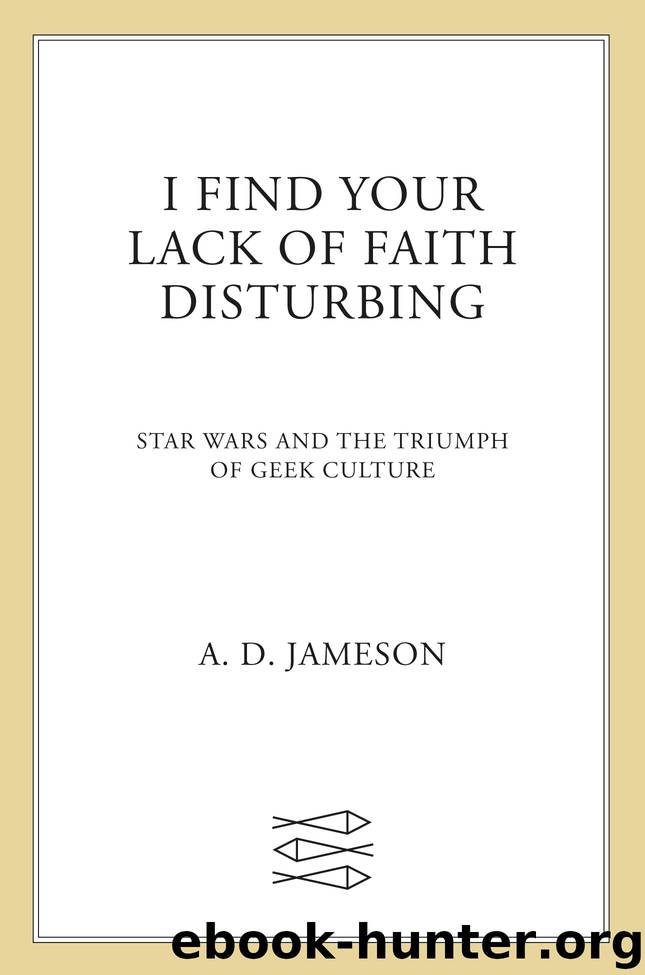I Find Your Lack of Faith Disturbing by A. D. Jameson

Author:A. D. Jameson
Language: eng
Format: epub
Publisher: Farrar, Straus and Giroux
seven.
GEEKING OUT
While introducing Howard Hawks’s classic Western Rio Bravo at the 2007 Cannes Film Festival, Quentin Tarantino called it “one of the great hang-out movies,” his idea being that you spend so much of the film’s 141 minutes cooped up with John Wayne’s John T. Chance and his allies in the town jail as they wait for their foes to attack, that Chance and the others “actually become your friends.” Even better, Tarantino continued, is that when you watch the movie again, “they already are your friends, and you’re just hanging out with John T. Chance, and Dude, and Feathers.” Howard Hawks himself might have agreed with Tarantino: he all but remade Rio Bravo seven years later, as El Dorado, then again, albeit more loosely, as Rio Lobo.
Tarantino claimed that hang-out movies are rare, but geeks beg to differ—or maybe they’re just better at making imaginary friends? Time and again, geeks return to beloved TV shows, movies, comics, and novels in order to hang out with their favorite fictional characters, drinking in the slow middle section of The Empire Strikes Back, in which Princess Leia and Han Solo hide in an asteroid from the Empire, their bickering giving way to smooching, or rewatching Star Trek: The Next Generation start to finish, once again vicariously walking the halls of the Enterprise, and sitting down to play poker with Data and Worf and Troi and Geordie and Dr. Crusher. Geeks will even rewatch bad entries in a franchise, films like Star Trek III: The Search for Spock and Star Trek V: The Final Frontier, just to be able to pass time with cherished friends like Kirk and his crew.
But geeks have long thought of artworks as places where one can hang out. Right at the start of his 1939 lecture on world-building, “On Fairy-Stories,” J.R.R. Tolkien describes himself not as a reader of stories, but as a visitor of other places, “a wandering explorer (or trespasser)” in a fantastical other realm that’s full of peril, containing “pitfalls for the unwary and dungeons for the overbold.” For Tolkien, for geeks, stories are opportunities to escape to another place, which is why Lucas labored so mightily to make the planets in Star Wars seem real, why the gamers at West End invented so much backstory for the regulars at the Mos Eisley Cantina, and why Neill Blomkamp said he wouldn’t want to make films that didn’t involve “creating a world for people to go to.” When geeks buy tickets to see movies, in their minds they’re purchasing tickets to travel elsewhere—on a spaceship, or in a TARDIS, or through a magical portal akin to the wardrobe in The Lion, the Witch and the Wardrobe, through which the Pevensie children passed from war-torn England into Narnia.
The final barrier to overcome in geek storytelling is, therefore, the one between the fictional world and ours: it is fiction itself. This is why geeks favor realism and world-building, which impart to fiction the look of nonfiction, and the weight of historical fact.
Download
This site does not store any files on its server. We only index and link to content provided by other sites. Please contact the content providers to delete copyright contents if any and email us, we'll remove relevant links or contents immediately.
4 3 2 1: A Novel by Paul Auster(11045)
The handmaid's tale by Margaret Atwood(6852)
Giovanni's Room by James Baldwin(5877)
Big Magic: Creative Living Beyond Fear by Elizabeth Gilbert(4723)
Asking the Right Questions: A Guide to Critical Thinking by M. Neil Browne & Stuart M. Keeley(4574)
On Writing A Memoir of the Craft by Stephen King(4213)
Ego Is the Enemy by Ryan Holiday(3991)
Ken Follett - World without end by Ken Follett(3972)
The Body: A Guide for Occupants by Bill Bryson(3797)
Bluets by Maggie Nelson(3708)
Adulting by Kelly Williams Brown(3668)
Guilty Pleasures by Laurell K Hamilton(3586)
Eat That Frog! by Brian Tracy(3512)
White Noise - A Novel by Don DeLillo(3434)
The Poetry of Pablo Neruda by Pablo Neruda(3366)
Alive: The Story of the Andes Survivors by Piers Paul Read(3309)
The Bookshop by Penelope Fitzgerald(3225)
The Book of Joy by Dalai Lama(3217)
Fingerprints of the Gods by Graham Hancock(3211)
